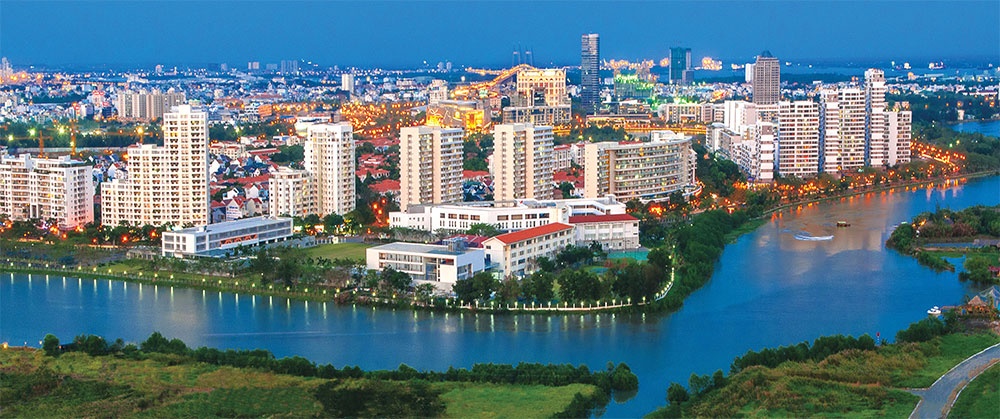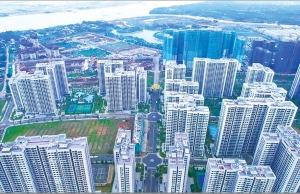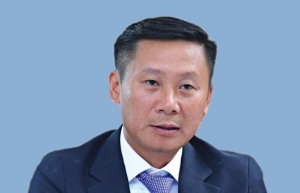Land rules widened to aid tourism
 |
| A change to land rules could prove a boost for tourism development, Photo: Le Toan |
The draft revised Land Law is being reviewed and completed by authorities and bodies at all levels before being submitted to the National Assembly in its next session, set to kick off on October 23.
Mix-use housing projects, new urban areas combined with commercial businesses, tourism, entertainment and multipurpose complexes are currently excluded in the revised draft, which regulates what land the state can repossess to hand over to investors for development.
This means investors of the aforementioned projects have to negotiate compensation expenses directly with landowners. This is difficult as investors can rarely landowners, and projects have been delayed for years accordingly.
However, if those projects are included in the list of land repossessed by the state for economic and social development, they will be compensated by the local authorities. The state is responsible for land repossesses and handover to investors. Investors can receive land and deploy project construction on schedule.
Developing tourism infrastructure is one of the important solutions to turn it into a key economic sector, according to a 2017 Politburo resolution stating that tourism should be the anchor economy.
Professor Dang Hung Vo, former Deputy Minister of Natural Resources and Environment, said that tourism development projects used to be included in the state’s land acquisition in the 2003 Land Law, and that decree 84/2007/ND-CP from 2007 also legislated tourism as a leading sector appropriate for state land repossessions.
However, in the 2013 Land Law, this regulation was removed, and the current revised draft did not mention this subject any more.
“Although the land law has been edited many times, it still left tourism projects behind and this goes against conditions on the ground,” Vo said. “To make tourism become a key economic sector, we need to have specific regulations on tourist land and open policies and mechanisms on land, taxes, investment for tourism real estate. To achieve that, tourism projects and tourism complexes must be subject to state land recovery.”
According to Vu Tien Loc, a member of the National Assembly of Hanoi, it is necessary to add these new land types to the revised law.
“For many localities, the construction of new urban areas and large-scale, modern entertainment tourism projects are really necessary in the process of socioeconomic development,” he said.
“In fact, there have been many projects delayed for many years due to problems in land use rights transference. Therefore, for some specific projects, if the state takes the right to recover land, they will be implemented faster and more efficiently.”
Lawyer Doan Van Binh, vice chairman of the Vietnam National Real Estate Association and chairman of CEO Group agrees.
“These additional types of land repossessed by the state will help the current legal system become more consistent with bidding regulation for selecting investors to implement projects and avoiding discrimination between types of land,” Binh said.
In addition, experts have also suggested permitting bidding to choose investors for new urban development projects for more than 300ha, combined with services, entertainment, and multi-functional projects.
In reality, Vietnam has many large-scale urban projects spanning hundreds of hectares, such as Phu My Hung, Vinhomes Ocean Park, Vinhomes Dream City, WaterPoint Long An, and many others.
The addition of large-scale urban projects and multipurpose complexes into the list of land the state may repossess is in line with international trends and actual development needs.
The method of selecting investors through bidding will ensure the successful selection of investors experienced in implementing similar projects and financial capacity.
| VIR to hold seminar “Revising the Land Law: Creating Land Funds for Tourism” The seminar themed “Revising the Land Law: Creating Land Funds for Tourism” organised by Vietnam Investment Review will take place at 47 Quan Thanh, Ba Dinh district, in Hanoi on October 19. Experts and participants will discuss hot issues in land repossession for socioeconomic development for national and public benefit, bidding to select investors, and residual methodology. The seminar will also be live-streamed on tinnhanhchungkhoan.vn and VIR’s fan pages. |
 | Land law points further scrutinised Clarifications on land use rights and property ownership for overseas lenders have been offered to the government from the foreign business community. |
 | Amended land law can remove current limitations The Law on Land is an essential law, institutionalising the major guidelines of regulation on continuing to innovate and complete institutions and policies, and improve the effectiveness and efficiency of management and use of land, creating a driving force to help Vietnam become a high-income developed country. |
 | Legal issues in land use still stifling development Lawyer Nguyen Hong Chung, chairman of DVL Ventures and vice chairman of the Hanoi Real Estate Club discussed with VIR’s Duc Thanh about land law mechanisms and policies, ahead of the upcoming session of the National Assembly on October 23. |
What the stars mean:
★ Poor ★ ★ Promising ★★★ Good ★★★★ Very good ★★★★★ Exceptional
Related Contents
Latest News
More News
- Construction firms poised for growth on public investment and capital market support (February 11, 2026 | 11:38)
- Mitsubishi acquires Thuan An 1 residential development from PDR (February 09, 2026 | 08:00)
- Frasers Property and GELEX Infrastructure propose new joint venture (February 07, 2026 | 15:00)
- Sun Group led consortium selected as investor for new urban area (February 06, 2026 | 15:20)
- Vietnam breaks into Top 10 countries and regions for LEED outside the US (February 05, 2026 | 17:56)
- Fairmont opens first Vietnam property in Hanoi (February 04, 2026 | 16:09)
- Real estate investment trusts pivotal for long-term success (February 02, 2026 | 11:09)
- Dong Nai experiences shifting expectations and new industrial cycle (January 28, 2026 | 09:00)
- An Phat 5 Industrial Park targets ESG-driven investors in Hai Phong (January 26, 2026 | 08:30)
- Decree opens incentives for green urban development (January 24, 2026 | 11:18)

 Tag:
Tag:




















 Mobile Version
Mobile Version